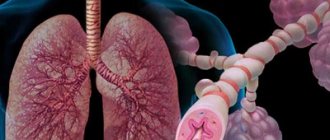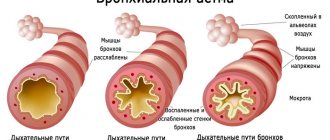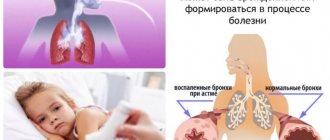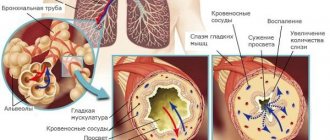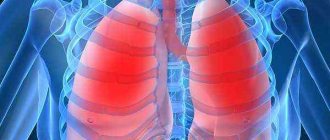Bronchial asthma is a pathology of the respiratory tract in a chronic form. The main symptom of the disease is an attack of suffocation, which, in the absence of qualified treatment, can provoke the death of the patient. The disease cannot be completely eliminated. Drug therapy is aimed only at alleviating the patient’s condition and relieving symptoms. The disease can occur at any age, and the main condition for preserving life with this pathology is quitting smoking.
Asthma and smoking - a dangerous connection
If a person is diagnosed with bronchial asthma, the first step in the treatment program is a complete cessation of smoking, including passive smoking. In addition, do not forget that smoking patients with asthma increases the risk of irreversible changes in the lungs. Smoking is extremely dangerous for asthmatics!
This categorical measure is necessary for normal treatment and to stabilize the patient’s condition, since smoking in asthma simultaneously has a negative effect on the entire respiratory system, on the immune system and on local protective reactions in the lungs.
Studies conducted in the USA have revealed a clear connection between asthma and smoking; people who have been diagnosed with this disease are one and a half times more likely to suffer from nicotine addiction or have been smokers before. According to their research, a person who has been an active smoker for more than 10 years has a 2-fold higher risk of developing bronchial asthma, and if among his immediate relatives there were people suffering from this disease, then the likelihood of this pathology occurring at one time or another is equal to almost 100%!
The dangers of smoking for asthmatics
Active
A dangerous mixture of tobacco smoke and nicotine tar is a very strong irritant. Once in the lungs, they have a depressing effect on anti-inflammatory enzymes. The respiratory system is under severe stress , which is very harmful for asthmatics.

Even in the absence of complaints, irreversible processes occur in a sick body:
- The respiratory system becomes clogged with toxins.
- The lungs lose their elasticity, the bronchi narrow.
- The amount of sputum produced increases.
- Resins and fragrances cause allergic reactions.
- Attacks of suffocation and severe coughing become more frequent.
Pathological changes lead to oxygen starvation and deterioration of the patient's condition. Asthmatic smokers will experience constant malaise and weakness. In addition to the classic symptoms of asthma (cough, choking, shortness of breath), frequent headaches, increased sweating, rapid pulse, drowsiness, and bloating of the veins in the neck are observed. This is explained by the fact that smoking in asthma negatively affects not only the respiratory system . All organs suffer, the body self-destructs, and if this process is not stopped in time, the disease can result in death.
Pregnant women are at particular risk. If a pregnant woman smokes, the likelihood of developing asthma in the unborn child is very high. Nicotine is transmitted to the unborn baby through the blood and is addictive. Problems with lung function in such children appear 5 times more often than in women who do not smoke excessively.
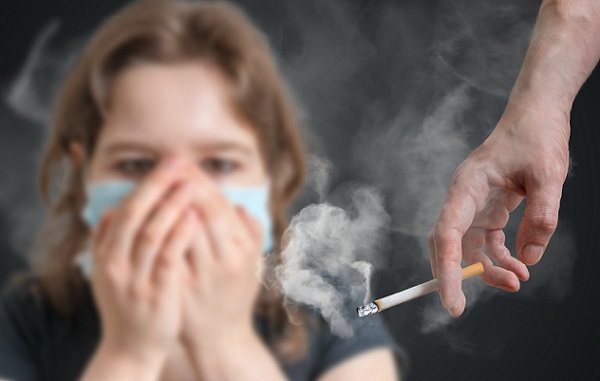
Passive
The danger and harm of passive smoking for the health of asthmatics has long been proven. Inhaled smoke contains a huge amount of nicotine , tar and other harmful substances, which are difficult to protect yourself from. Allergens and nicotine substances settle on food, clothing and furniture. Even ventilation does not save you from toxic elements. The chemical filling of cigarettes leads to irritation of the respiratory tract, allergic reactions and poor health.
Advice! When diagnosed with asthma, the patient must avoid smoking areas and stay away from those who smoke. Any contact with tobacco smoke complicates the course of the disease.
Nature and symptoms of bronchial asthma
Bronchial asthma is a chronic allergic disease of the upper respiratory tract, which is characterized by alternating attacks and periods of remission. This disease is based on changes in the mucous membrane of the respiratory tract and their increased reactivity. Due to frequent allergies or colds, the mucous membrane thickens, the airways narrow, and the mucus normally produced in the bronchi becomes thicker and more viscous, interfering with normal gas exchange. The increased sensitivity of such altered mucosa leads to the easy development of bronchospasm - a reflex narrowing of the bronchi when any irritant enters the respiratory tract.
Bronchial asthma in adults is characterized by a gradual onset, constant cough with scanty sputum, shortness of breath, change in skin color, general deterioration of the condition, then attacks appear.
An attack of bronchial asthma can develop suddenly or before its onset the patient experiences an “aura” - headache, irritability, general malaise, and so on. After some time, a strong cough appears, the patient “coughs” and cannot stop, shortness of breath gradually increases, and heavy wheezing can be heard from a distance, with difficulty inhaling. Such an attack can last from several minutes to several hours, and greatly exhausts the patient, leaving behind weakness, headache and poor health.
Is it possible to smoke an electronic cigarette, hookah, vape, or marijuana if you have asthma?
The effect of electronic cigarettes, vaping and other smoking gadgets has an effect equivalent to smoking . Therefore, using them as an alternative is not appropriate. Moreover, flavoring oils, which manufacturers often add to smoking liquid, can provoke an allergic attack.
Hookah can cause a severe cough in a person with asthma. The reason is that the smoking mixture contains various additives that are allergens.
Smoking marijuana is dangerous for asthma. Under the influence of a hallucinogenic substance, an asthmatic cannot recognize the symptoms inherent in asthma and simply suffocate.
Moreover, narcotic substances more irritate the mucous membranes of the respiratory tract, which increases the likelihood of negative consequences.
Passive smoking and asthma
According to doctors and scientists, the combination of “asthma and second-hand smoke” is no less dangerous to health, especially when it comes to small children and pregnant women.
When smoking 1 cigarette, more than half of all harmful substances enter the surrounding space and quickly penetrate the respiratory tract of those nearby - relatives or colleagues of the smoker. Which causes exactly the same effects as a personally smoked cigarette, this is what explains all the bans on smoking at work and in public places; people who care about their health do not want to suffer due to the fault of those who continue to poison themselves and others with toxic smoke.
Passive smoking poses the greatest danger to pregnant women and children. Having a carcinogenic effect, tobacco smoke substances easily penetrate the placental barrier and enter the body of the developing fetus. This can lead to the birth of low birth weight babies, children with mental and physical development delays, respiratory diseases and allergic reactions.
Children in the first years of life also suffer greatly from inhaling tobacco smoke; a not fully formed body cannot completely cleanse the lungs of harmful substances, mucus accumulates in them, constant irritation causes frequent colds and ARVI, and all this, in turn, provokes the development of bronchial asthma.
Alcohol

Doctors advise patients with asthma to follow a diet, avoid foods with added preservatives, smoked, fatty foods, sausages and sweets. Such foods contain chemical compounds that increase inflammatory processes in the bronchi. Many people are interested in whether it is possible to drink alcohol if you have asthma? Alcoholic drinks do not have a direct effect on the respiratory system, but it is highly undesirable to abuse them . It is difficult to determine the permissible safe dose of ethanol, since the individual susceptibility to alcohol varies from person to person.
Consequences of alcohol abuse
Alcohol is quickly absorbed into the gastrointestinal tract. Once in the vascular bed, it increases blood clotting, dilates blood vessels, and increases heart rate. The vessels in the lungs of an asthmatic are thinner than those of a healthy person, and under increased stress the thickened blood does not have time to be fully saturated with oxygen. Therefore, human tissues and organs, primarily the nervous system and brain, suffer from hypoxia. The risk of blood clots increases.
Alcohol weakens the immune system. The body's defenses are spent on neutralizing and removing alcohol toxins from the body. The load on the liver and kidneys increases. Against the background of general weakness, chronic diseases, which include asthma, can become acute.
An additional danger is the combined use of anti-asthma medications and alcohol. When using most drugs, alcoholic beverages are strictly contraindicated. Combinations of alcohol and pharmacological substances can lead to the development of an allergic reaction, from mild urticaria to angioedema with possible death.
What alcoholic drinks can you take if you have asthma?
Many people, having lost confidence in traditional medicine, turn to traditional healers. Almost all home recipes include vodka or alcohol. The effect of such treatment is short-term and has a psychological basis: the patient feels improvement because he believes in the power of folk remedies. However, in the future, problems with the liver and gastrointestinal tract, and alcoholism may join asthma. Therefore, experts are categorically against unconventional methods and insist on the use of pharmacological drugs.
Thus, in case of bronchial asthma, drinking alcohol is extremely undesirable. If an asthmatic feels the need to drink alcohol, he should first consult with his doctor, who can assess the clinical picture of the disease and make recommendations.
It is better for the patient to drink during periods of remission, when there is no need to take maintenance medications. Your choice should be limited to drinks with low alcohol content and limited to small doses.
Please follow and like us:
Why should you quit smoking?
Smoking has a harmful effect even on a completely healthy body; more than 90% of long-term smokers suffer from chronic bronchitis or other pulmonary diseases, about 50% of patients with lung cancer are smokers. After 10-15 years of continuous smoking, the patient complains of shortness of breath, exercise intolerance, frequent cough, bad breath, and so on. Children whose parents actively smoke get sick more often, lag behind their peers in development, start smoking earlier, and have behavior problems.
Only 5-10 years after stopping smoking, the body more or less returns to its previous “non-smoking state”, and the sooner the patient quits smoking, the more chances he has to restore his health and not ruin the lives of the people around him.
For patients with bronchial asthma, smoking is absolutely contraindicated; if they want to live fully, and not suffocate in painful, practically uncontrollable attacks of shortness of breath, they need to quit smoking. Otherwise, treatment of bronchial asthma will not give any results.
Smoking does not give anything to the patient’s body, it only takes away - money, health, full breathing, life itself. Whether it is worth risking your health and the health of others for the sake of a bad habit or whether to give up smoking, each person decides for himself. But, if you have been diagnosed with bronchial asthma, or someone from your immediate circle suffers from this disease, you don’t have to choose here; quitting smoking is the only way to stop this disease.
Consequences
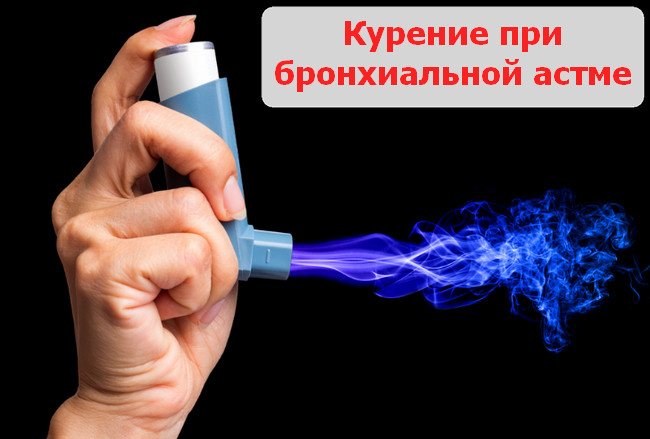
Under the influence of tobacco smoke, disease control worsens, and asthma can move from one stage to the next, more severe one. The effectiveness of drugs that dilate the bronchi is significantly reduced, and over time, resistance to them develops. In people exposed to bad habits, attacks occur more often and are more severe.
Tobacco smoke with prolonged exposure causes the following consequences:
- status asthmaticus;
- chronic obstructive pulmonary disease (COPD);
- malignant tumors.
The risk of bronchitis, pneumonia, and pulmonary tuberculosis also increases. Irreversible changes occur in the bronchi and lungs themselves - emphysema and pneumosclerosis.
Symptoms of pathology
Inflammatory processes leading to respiratory failure of the branches of the windpipe lead to impaired ventilation of the lungs and poor mucus discharge. The focus of inflammation grows from the trachea to the alveolar ducts of the lungs.
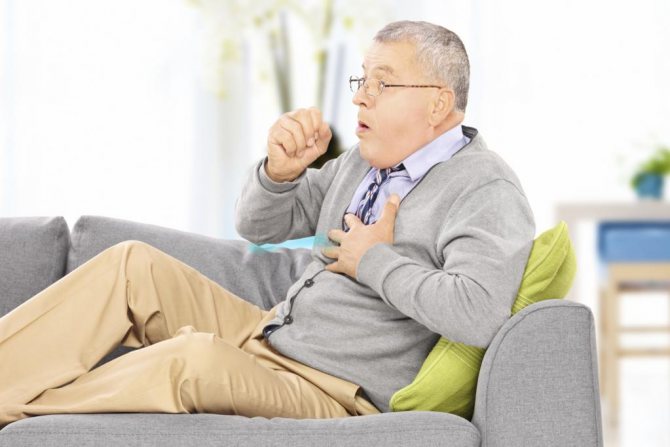
The main symptoms of asthma are disturbances in the frequency and depth of breathing. You can also suspect asthma if symptoms such as:
- sonorous whistling wheezing;
- feeling of tightness in the chest;
- wet cough, worse at night;
- seasonal exacerbations of rhinitis;
- episodes of suffocation accompanied by chest pain;
- sputum discharge during coughing;
- a sharp deterioration of symptoms upon contact with irritants and allergens;
- complications even with minor colds.
Usually, smoking before bronchial asthma causes rare coughing attacks. You should be wary if after cigarettes, even just from smoke, your throat begins to feel very sore, and it is impossible to clear your throat for a long time.
What influences the occurrence of pathology
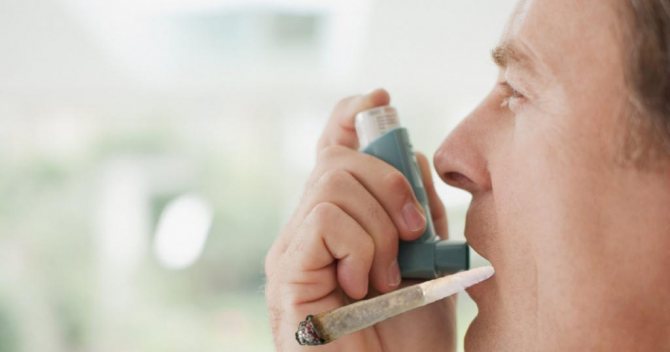
The main factors causing the development of bronchial asthma are allergens. Despite their different origins, they all disrupt the autonomic regulation of persistent excitation of bronchial smooth muscles and increase the resistance of the respiratory organs. The most well-known allergens are:
- household - dust, pet hair;
- professional - mineral dust, harmful fumes;
- meteorological - windy weather, high humidity;
- environmental - gas pollution.
The trigger that causes asthma attacks and a crisis of the disease is smoking. A cigarette emits many harmful elements such as nicotine and tar. They have a destructive effect, causing various diseases. Many of them, such as bronchitis, contribute to the occurrence of bronchial asthma. According to research results, with 10 years of cigarette smoking experience, the risk of developing the disease doubles.
At the very least, the following questions look strange: is it possible to smoke with bronchial asthma, are smoking and asthma compatible, considering that nicotine is generally dangerous.
Difference between electronic and regular cigarette
In industrial conditions, already harmful tobacco is exposed to various carcinogens. In addition to tobacco, the paper in which it is wrapped also burns, and accordingly, a large amount of complex toxic substances enters the lungs.
An electronic cigarette is a device for burning a liquid mixture, which often does not contain nicotine at all. When turned on, the device heats the liquid, turning it into vapor, which the person smokes. The main differences between electronic cigarettes:
- the nicotine in the device is liquefied and purified;
- no resins;
- the absence of a combustion process minimizes the likelihood of fire;
- Only the smoker receives harm from the device.


